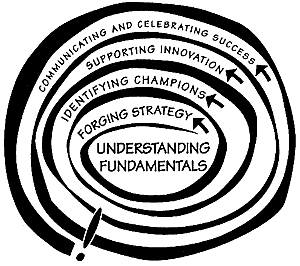 |
|
||||
|
|
|
|
|
|
|
|
Critical Issues
Annually, the Consortium develops and publishes a Critical Issues monograph drawing on ideas and information gleaned from its Think Tank for executive officers. Member institutions receive multiple complimentary copies of these monographs. Additional copies are available for purchase separately or as a set.
Contact the Consortium office at 734-647-1973 or cccd@umich.edu to place an order. Since 1996, three mongraphs have been published, all authored by Patricia Carter and Richard Alfred:
Breaking Out of the Box:
Reaching for the Future (1997)
Making Change Happen (1998-9) Colleges today are truly at a crossroads at which they will be forced to make critical choices about the path they will take toward the future. These choices are perplexing. They involve change and the status quo and there are no easy answers. Regardless of the choice, some degree of change is implicit and awaits us. Yet, as one college observed: "No matter how much we talk about it, we simply don't know enough about change as a process." Making Change Happen continues the Consortium's contributions to our shared learning about change by synthesizing the observations, conclusions and questions of community college leaders who participated in Think Tanks throughout 1998 and 1999. The opening sections-College 2000: Balancing Continuity and Change and Getting Real about Change-look at our current status. What is real and unreal about change? Where are we in the transformation process? What have we learned? What is working? Can we identify themes and trends from individual college experiences that advance our understanding about change? In the closing section-Designing Successful Change-common ingredients from successful community college experiences with change are synthesized to form a blueprint to address the question: How do we undertake successful change? Our tendency has been to pursue change where we think it is most needed. More often than not, this has resulted in a bewildering tangle of resistance - a lose-lose situation for everyone involved. Change is a systematic process and it needs to be viewed that way. Through the analysis of successes-and failures-Think Tank participants identified a systematic process that helps us to address essential parts of the process that we commonly overlook. This monograph extends a conversation that we invite you to join. By sharing our learning and experience, we can begin to build a better understanding of how successful change can happen on any campus, anywhere, at any time. |



